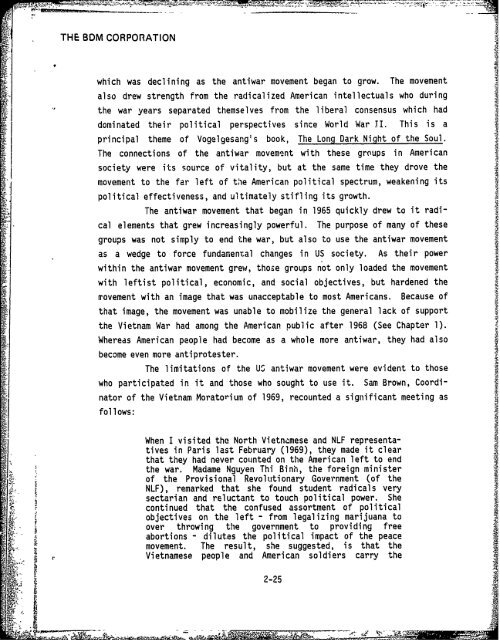policy - The Black Vault
policy - The Black Vault
policy - The Black Vault
Create successful ePaper yourself
Turn your PDF publications into a flip-book with our unique Google optimized e-Paper software.
I<br />
Q<br />
_IN,<br />
THE BDM CORPORATION<br />
which was declining as the antiwar movement began to grow.<br />
<strong>The</strong> movement<br />
also drew strength from the radicalized American intellectuals who during<br />
"the war years separated themselves from the liberal consensus which had<br />
dominated their political perspectives since World War NtI. This is<br />
principal theme of Vogelgesang's book, <strong>The</strong> Long Dark Night of the Soula<br />
<strong>The</strong> connections of the antiwar movem'ýnt with these groups in American<br />
society were its source of vitality, but at the same time they drove the<br />
movement to the far left of the American political spectrum, weakening its<br />
political effectiveness, and ultimately stifling its growth.<br />
<strong>The</strong> antiwar movement that began in 1965 quickly drew to it radical<br />
elements that grew increasingly powerful. <strong>The</strong> purpose of many of these<br />
groups was not simply to end the war, but also to use the antiwar movement<br />
as a wedge to force fundamental changes in US society. As their power<br />
within the antiwar movement grew, those groups not only loaded the movement<br />
with leftist political, economic, and social objectives, but hardened the<br />
rovement with an image that was unacceptable to most Americans.<br />
a<br />
Because of<br />
that image, the movement was unable to mobilize the general lack of support<br />
the Vietnam War had among the American public after 1968 (See Chapter 1).<br />
Whereas American people had become as a whole more antiwar, they had also<br />
become even more antiprotester.<br />
<strong>The</strong> limitations of the US antiwar movement were evident to those<br />
who participated in it and those who sought to use it. Sam Brown, Coordinator<br />
of the Vietnam Moratorium of 1969, recounted a significant meeting as<br />
follows:<br />
Z•k -2-25<br />
When I visited the North Vietnamese and NLF representatives<br />
in Paris last February (1969), they made it clear<br />
that they had never counted on the American left to end<br />
the war. Madame Nguyen Thi Binh, the foreign minister<br />
of the Provisional Revolutionary Government (of the<br />
NLF), remarked that she found student radicals very<br />
sectarian and reluctant to touch political power. She<br />
continued that the confused assortment of political<br />
objectives on the left - from legalizing marijuana to<br />
6 over throwing the government to providing free<br />
abortions -dilutes the political impact of the peace<br />
movement. <strong>The</strong> result, she suggested, is that the<br />
r Vietnamese people and American soldiers carry the<br />
Ar~
















